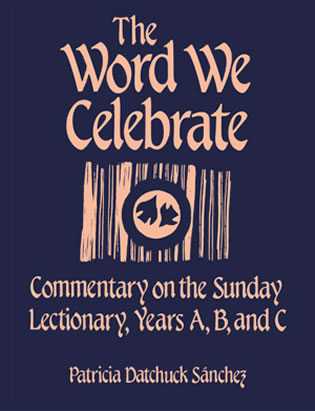
"Almost two thousand years ago, on the desert road that stretched from Israel to Gaza, a well-to-do businessman commuting home from Jerusalem was puzzling over a difficult passage from the prophet Isaiah. For all his adeptness in the world of high finance, the commuter was at a loss as to what the prophet's message meant for his life and times . . . 'How can I grasp it,' he complained, 'unless someone explains it to me?' Fortunately, Philip came to the rescue and, as Luke explained it, he 'launched out with the Isaian scripture text as his starting point and told him the good news of Jesus!' (Acts 8:31, 35).
"In two thousand years, the situation has changed little. All of us are still commuters in this life (the second Vatican Council called us pilgrims), searching for meaning and purpose. Like the ancient Ethiopian on the road to Gaza, we have discovered that the source of all meaning and our purpose for being lies in the mystery we name as God and in the word through which he communicates himself to us. But and in this we are also like the Ethiopian—most of us need help in discerning that word . . . in understanding what it meant when the author wrote it and what it means for us and our own world today. For this help, we rely on those whose special vocation it is to celebrate the mysteries of our salvation and to elucidate those mysteries for us.
"Recognizing both the need and desire of the faithful to be-come more attuned to the Word of God, the participants at the Second Vatican Council initiated a liturgical reform which accented the importance of the Word incarnate (Jesus), and inscribed (Scripture).
"In their first document, promulgated 4 December 1963, the Council members declared, 'The treasures of the Bible are to be opened up more lavishly so that richer fare may be provided for the faithful at the table of God's Word. In this way, a more representative portion of the Holy Scriptures will be read to the people over a set cycle of years.' Then, in order to make the Word more easily accessible to the believing community, the importance of the homily was under-scored: 'By means of the homily, the mysteries of the faith and the guiding principles of the Christian life are expounded from the sacred text during the course of the liturgical year. The homily, therefore, is to be highly esteemed as part of the liturgy itself . . .' (Constitution on the Sacred Liturgy, #51, 52)
"Following the Council's directives, the Sacred Congregation for Divine Worship, exactly twenty years ago, published the order of readings for the liturgy as we know it today. Previous to 30 November 1969, the lectionary followed a one year cycle of readings with two texts being featured at each celebration. Now the Sunday celebrations present the praying congregation with three biblical selections from both the Jewish and Christian Scriptures and the cycle for the Sunday texts has been extended over a three year period.
"This book, The Word We Celebrate, has been written in an effort to aid all who are involved in the sacred liturgy, from the pulpit to the pew. By no means a substitute for personal study, prayer and reflection on the Sacred word, this work nevertheless acknowledges the exigencies of busy schedules and offers itself as a quick and ready reference. While this work will provide commentary on the scriptural texts, it does not in any way purport to be a ready-made collection of homilies. Only the homilist, sympathetic to the needs of his/her congregation and in full awareness of their pastoral situation can use this material to shape an appropriate message for his/her community.
"Perhaps those who prepare to elucidate the sacred Word for the sake of the community would also do well to remember young Eutychus. Though Paul was, no doubt, enthusiastic and eloquent, nevertheless by midnight, Eutychus grew weary and fell asleep; then he suffered a fatal fall from a third-floor height. Although Paul raised the boy to life, few of us share the apostle's talents or powers. Suffice it to say, the Eutychus incident in Acts 20 makes a clear case for homilies that are succinct and challenging.
"If the Word of God becomes more tangible, better under-stood and more central to the lives of those who read it . . ., if more people are challenged through the Word of God to live according to the values of the gospel, then this work will have accomplished its purpose.
"Most of the pages that follow were first published in the monthly issues of Celebration, beginning in 1984. At the suggestion of William Freburger, editor of Celebration, and due in no small part to his efforts and insight, this work has been updated and completed. I am indebted to Bill for his collaboration and will always be grateful for the opportunities in ministry this work has afforded me." (from the Introduction)
(Purchase of this title helps you qualify for the free shipping option if it is being offered at the time of your order.)